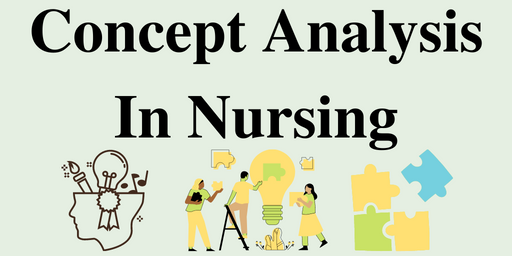The Concept analysis in nursing is a method used to dissect and clarify nursing concepts for better understanding and application in research, theory development, and practice.
It involves examining the concept’s defining attributes, antecedents, consequences, and borderline and contrary cases to establish a clear and precise definition.
Concept Analysis In Nursing Concept Analysis in Health Care
Concept analysis is a crucial strategy employed in health care to dissect and examine various concepts within the field. By focusing on the semantic structure of these concepts, researchers can clarify their meanings and applications. Although multiple methodologies exist for conducting concept analysis, they all aim to uncover the defining attributes or characteristics of the concept under scrutiny. This rigorous examination allows for a deeper understanding of the concept, which can lead to improved practices and outcomes in health care.
The utility of concept analysis extends beyond mere definitions; it also plays a vital role in refining and clarifying concepts within nursing theory, practice, and research. This refinement leads to the establishment of precise theoretical and operational definitions, which are essential for research endeavors and instrument development. While concept analysis has been a longstanding practice in disciplines such as philosophy and linguistics, its adoption in nursing has gained momentum only in recent decades. This shift reflects a growing recognition of the importance of semantics and language development within the nursing profession.
Concept Analysis as a Tool
Concept analysis serves as a powerful tool for nursing researchers, offering several benefits that enhance the research process. One of the primary outcomes of a concept analysis is the identification of defining characteristics that inform the researcher about what constitutes the concept. This understanding empowers researchers to:
- Formulate Clear Definitions: By developing precise theoretical and operational definitions for the concept, researchers can establish a solid foundation for their studies.
- Choose Appropriate Measurement Instruments: With a clear understanding of the defining characteristics, researchers can select measurement instruments that accurately reflect the concept being studied. This alignment ensures the integrity of the research findings.
- Determine the Need for New Instruments: If existing measures do not adequately capture the defining characteristics, concept analysis helps researchers recognize the necessity for new instruments tailored to their specific needs.
- Accurately Identify the Concept in Practice: A well-defined concept allows nurses to recognize it in clinical practice or qualitative research data, facilitating better understanding and application in real-world scenarios.
By employing concept analysis, nurses can enhance their research capabilities and contribute to the overall advancement of nursing knowledge.
Concept Analysis in Nursing Research
Historically, concept analysis in nursing research was scarce until the early 1980s. However, its prevalence has surged over the past two decades, underscoring its relevance in a rapidly evolving discipline. Nursing, as a young science, greatly benefits from the rigorous thinking required in concept analysis. This process encourages researchers to critically evaluate the language used to describe nursing phenomena, fostering a heightened awareness of how concepts are articulated.
A clear understanding of language is essential for nursing scientists to construct a coherent body of knowledge. Moreover, thoughtful practitioners must remain attuned to the terminology of the discipline. The way nurses conceptualize and communicate about their practice is critical for ensuring that consumers of nursing care and policymakers grasp the essence of nursing and the roles of nurses within the healthcare system. Without a well-defined core of concepts, ambiguity and confusion can hinder the development of nursing science.
Usefulness of Concept Analysis for Nursing
Concept analysis has emerged as a valuable adjunct to nursing research, significantly enhancing communication between researchers and practitioners. By delineating the defining characteristics of a concept, researchers clarify its meaning, allowing for more effective discussions and shared understanding among all stakeholders involved in nursing. This clarity fosters better collaboration between scientists and practitioners, leading to improved communication about the relevance and appropriateness of nursing language.
Furthermore, the findings from concept analyses contribute to the body of nursing knowledge, providing insights that can inform practice, education, and policy. As nursing continues to evolve, the need for precise and well-articulated concepts becomes even more critical. The ongoing dialogue about these concepts strengthens the foundation of nursing as a discipline and enhances its credibility within the broader healthcare landscape.
Literature Review
The literature surrounding concept analysis is rich with discussions regarding the most effective methods of analysis. Despite the diversity of approaches, there is a consensus on the significant contributions that concept analysis can make to the understanding of phenomena pertinent to nursing. Various researchers have examined the efficacy of different analytical methods, each presenting unique insights and applications.
For instance, some studies highlight the importance of context in concept analysis, emphasizing that understanding the social and cultural dimensions of nursing concepts can enhance their relevance and applicability. Other researchers focus on the psychological aspects of nursing concepts, exploring how emotions and interpersonal relationships shape the experiences of both nurses and patients.
Moreover, the impact of concept analysis extends beyond academic inquiry; it also influences clinical practice. Nurses who engage in concept analysis can better articulate the value of their work and the principles that guide their practice. This articulation not only benefits individual practitioners but also contributes to the collective understanding of nursing as a profession.
In conclusion, concept analysis is an indispensable tool in nursing research, serving to clarify and refine the language that underpins the discipline. By systematically examining concepts, nurses can enhance their understanding of the phenomena they encounter in practice, thereby improving patient care and advancing the field of nursing. As the discipline continues to evolve, ongoing research and dialogue about the nature of nursing concepts will be essential for ensuring that nursing remains a vital and respected component of the healthcare system.
Read More:
https://nurseseducator.com/didactic-and-dialectic-teaching-rationale-for-team-based-learning/
https://nurseseducator.com/high-fidelity-simulation-use-in-nursing-education/
First NCLEX Exam Center In Pakistan From Lahore (Mall of Lahore) to the Global Nursing
Categories of Journals: W, X, Y and Z Category Journal In Nursing Education
AI in Healthcare Content Creation: A Double-Edged Sword and Scary
Social Links:
https://www.facebook.com/nurseseducator/
https://www.instagram.com/nurseseducator/
